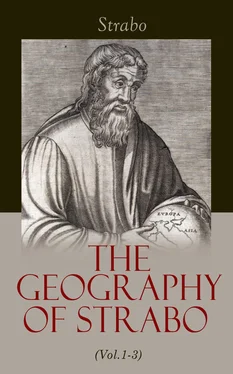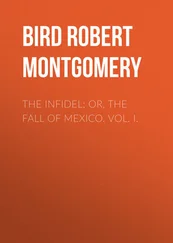Strabo - The Geography of Strabo (Vol.1-3)
Здесь есть возможность читать онлайн «Strabo - The Geography of Strabo (Vol.1-3)» — ознакомительный отрывок электронной книги совершенно бесплатно, а после прочтения отрывка купить полную версию. В некоторых случаях можно слушать аудио, скачать через торрент в формате fb2 и присутствует краткое содержание. Жанр: unrecognised, на английском языке. Описание произведения, (предисловие) а так же отзывы посетителей доступны на портале библиотеки ЛибКат.
- Название:The Geography of Strabo (Vol.1-3)
- Автор:
- Жанр:
- Год:неизвестен
- ISBN:нет данных
- Рейтинг книги:3 / 5. Голосов: 1
-
Избранное:Добавить в избранное
- Отзывы:
-
Ваша оценка:
- 60
- 1
- 2
- 3
- 4
- 5
The Geography of Strabo (Vol.1-3): краткое содержание, описание и аннотация
Предлагаем к чтению аннотацию, описание, краткое содержание или предисловие (зависит от того, что написал сам автор книги «The Geography of Strabo (Vol.1-3)»). Если вы не нашли необходимую информацию о книге — напишите в комментариях, мы постараемся отыскать её.
The Geography of Strabo (Vol.1-3) — читать онлайн ознакомительный отрывок
Ниже представлен текст книги, разбитый по страницам. Система сохранения места последней прочитанной страницы, позволяет с удобством читать онлайн бесплатно книгу «The Geography of Strabo (Vol.1-3)», без необходимости каждый раз заново искать на чём Вы остановились. Поставьте закладку, и сможете в любой момент перейти на страницу, на которой закончили чтение.
Интервал:
Закладка:
7. The first city between the windings of the Ebro and the extremities of the Pyrenees, near to where the Trophies of Pompey are erected, is Tarraco; 1194it has no harbour, but is situated on a bay, and possessed of many other advantages. At the present day it is as well peopled as Carthage; 1195for it is admirably suited for the stay of the prefects, 1196and is as it were the metropolis, not only of [the country lying] on this side the Ebro, but also of a great part of what lies beyond. The near vicinity of the Gymnesian Islands, 1197and Ebusus, 1198which are all of considerable importance, are sufficient to inform one of the felicitous position of the city. Eratosthenes tells us that it has a roadstead, but Artemidorus contradicts this, and affirms that it scarcely possesses an anchorage.
8. The whole coast from the Pillars up to this place wants harbours, but all the way from here to Emporium, 1199the countries of the Leëtani, the Lartolæetæ, and others, are both furnished with excellent harbours and fertile. Emporium was founded by the people of Marseilles, and is about 4000 1200stadia [Pg 240] [CAS. 160] distant from the Pyrenees, and the confines of Iberia and Keltica. This is a very fine region, and possesses good ports. Here also is Rhodope, 1201a small town of the Emporitæ, but some say it was founded by the Rhodians. Both here and in Emporium they reverence the Ephesian Diana. The cause of this we will explain when we come to speak of Massalia. 1202In former times the Emporitæ dwelt on a small island opposite, now called the old city, but at the present day they inhabit the mainland. The city is double, being divided by a wall, for in past times some of the Indiceti dwelt close by, who, although they had a separate polity to themselves, desired, for the sake of safety, to be shut in by a common enclosure with the Grecians; but at the same time that this enclosure should be two-fold, being divided through its middle by a wall. In time, however, they came to have but one government, a mixture of Barbarian and Grecian laws; a result which has taken place in many other [states].
9. A river 1203flows near to it, which has its sources in the Pyrenees; its outlet forms a port for the Emporitæ, who are skilful workers in flax. Of the interior of their country some parts are fertile, others covered with spartum, a rush which flourishes in marshes, and is entirely useless: they call this the Junc Plain. There are some who inhabit the Pyrenean mountains as far as the Trophies of Pompey, on the route which leads from Italy into Ulterior Iberia, 1204and particularly into Bætica. This road runs sometimes close to the sea, sometimes at a distance therefrom, particularly in the western parts. From the Trophies of Pompey it leads to Tarraco, 1205through the Junc Plain, the Betteres, 1206and the plain called in the Latin tongue [the plain] of Marathon, on account of the quantity of fennel growing there. From Tarraco [the road runs] towards the passage of the Ebro at the city of Dertossa; 1207from thence having traversed the city of Saguntum, 1208and Setabis, 1209it follows a course more and more distant from the sea, till it approaches the Plain of Spartarium, which signifies the Plain of Rushes. This is a vast arid plain, producing the species of rush from which cords are made, and which are exported to all parts, but particularly to Italy. 1210Formerly the road passed on through the midst of the plain, and [the city of] Egelastæ, 1211which was both difficult and long, but they have now constructed a new road close to the sea, which merely touches upon the Plain of Rushes, and leads to the same places as the former, [viz.] Castlon, 1212and Obulco, 1213through which runs the road to Corduba and Gades, 1214the two greatest emporia [of Iberia]. Obulco is distant about 300 stadia from Corduba. Historians report that Cæsar came from Rome to Obulco, and to his army there, within the space of twenty-seven days, when about to fight the battle of Munda. 1215
10. Such is the whole sea-coast from the Pillars to the confines of the Iberians and Kelts. The interior of the country lying above, and included between the mountains of the Pyrenees and the northern side [of Iberia], as far as the Astures, is principally divided by two mountain chains; the one of these is parallel to the Pyrenees, and takes its commencement from the country of the Cantabri, terminating at the Mediterranean. This is called the Idubeda. 1216The second, springing from the middle [of this first], runs towards the west, inclining however to the south and the sea-coast towards the Pillars. At the commencement it consists of bare hills, but after traversing the Plain of Spartarium, falls in with the forest lying above Carthage, 1217and the regions round Malaca. 1218It is named Orospeda. 1219The river Ebro flows between the Pyrenees and Idubeda, and parallel to both these mountains. It is fed by the rivers and other waters carried down [Pg 242] [CAS. 161] from [the mountains]. Situated on the Ebro is the city of Cæsar Augusta, 1220and the colony of Celsa, 1221where there is a stone bridge across the river. This country is inhabited by many nations, the best known being that of the Jaccetani. 1222Commencing at the foot of the Pyrenees, it widens out into the plains, and reaches to the districts around Ilerda 1223and Osca, 1224[cities] of the Ilergetes not far distant from the Ebro. It was in these cities, and in Calaguris, 1225a city of the Gascons, as well as those of Tarraco 1226and Hemeroscopium, 1227situated on the coast, that Sertorius sustained the last efforts of the war, after being ejected from the country of the Keltiberians. He died at Osca, and it was near to Ilerda that Afranius and Petreius, Pompey’s generals, were afterwards defeated by divus 1228Cæsar. Herda is distant 160 stadia from the Ebro, which is on its west, about 460 from Tarraco, which is on the south, and 540 from Osca, which lies to the north. 1229Passing through these places from Tarraco to the extremities of the Vascons who dwell by the ocean, near Pompelon 1230and the city of Œaso 1231situated on the ocean, the route extends 2400 stadia, to the very frontiers of Aquitaine and Iberia. It was in the country of the Jaccetani that Sertorius fought against Pompey, and here afterwards Sextus, Pompey’s son, fought against the generals of Cæsar. The nation of the Vascons, in which is Pompelon, or Pompey’s city, lies north of Jaccetania.
11. The side of the Pyrenees next Iberia is covered with forests containing numerous kinds of trees and evergreens, whilst the side next Keltica is bare: in the midst [the mountains] enclose valleys admirably fitted for the habitation of man. These are mainly possessed by the Kerretani, a people of the Iberians. The hams they cure are excellent, fully equal to those of the Cantabrians, 1232and they realize no inconsiderable profit to the inhabitants.
12. Immediately after passing Idubeda, you enter on Keltiberia, a large and irregular country. It is for the most part rugged, and watered by rivers, being traversed by the Guadiana, 1233the Tagus, and many other of the rivers which flow into the western sea, but have their sources in Keltiberia. Of their number is the Douro, which flows by Numantia 1234and Serguntia. The Guadalquiver 1235rises in Orospeda, and after passing through Oretania, enters Bætica. The Berones inhabit the districts north of the Keltiberians, and are neighbours of the Conish Cantabrians. They likewise had their origin in the Keltic expedition. Their city is Varia, 1236situated near to the passage of the Ebro. They are adjacent to the Bardyitæ, now called the Bardyli. 1237To the west [of the Keltiberians] are certain of the Astures, Gallicians, and Vaccæi, besides Vettones and Carpetani. On the south are the Oretani, and the other inhabitants of Orospeda, both Bastetani and Edetani, 1238and to the east is Idubeda.
13. Of the four divisions into which the Keltiberians are separated, the most powerful are the Aruaci, situated to the east and south, near to the Carpetani and the sources of the Tagus. Their most renowned city is Numantia. They showed their valour in the war of twenty years, waged by the Keltiberians against the Romans; for many armies of the Romans, together with their generals, were destroyed; and in the end the Numantians, besieged within their city, endured the famine with constancy, till, reduced to a very small number, they were compelled to surrender the place. The Lusones are also situated to the east, and likewise border on the sources of the Tagus. Segeda and Pallantia 1239are cities of the Aru>aci. [Pg 244] [CAS. 162] Numantia is distant from Cæsar Augusta, 1240situated as we have said upon the Ebro, about 800 stadia. Near to Segobriga and Bilbilis, 1241likewise cities of the Keltiberians, was fought the battle between Metellus and Sertorius. Polybius, describing the people and countries of the Vaccæi and Keltiberians, enumerates Segesama 1242and Intercatia amongst their other cities. Posidonius tells us that Marcus Marcellus exacted of Keltiberia a tribute of 600 talents, which proves that the Keltiberians were a numerous and wealthy people, notwithstanding the little fertility of their country. Polybius narrates that Tiberius Gracchus destroyed 300 cities of the Keltiberians. This Posidonius ridicules, and asserts that to flatter Gracchus, Polybius described as cities the towers such as are exhibited in the triumphal processions. 1243This is not incredible; for both generals and historians easily fall into this species of deception, by exaggerating their doings. Those who assert that Iberia contained more than a thousand cities, seem to me to have been carried away in a similar manner, and to have denominated as cities what were merely large villages; since, from its very nature, this country is incapable of maintaining so many cities, on account of its sterility, wildness, and its out-of-the-way position. Nor, with the exception of those who dwell along the shores of the Mediterranean, is any such statement confirmed by the mode of life or actions of the inhabitants. The inhabitants of the villages, who constitute the majority of the Iberians, are quite uncivilized. Even the cities cannot very easily refine the manners [of their inhabitants], as the neighbouring woods are full of robbers, waiting only an opportunity to inflict injury on the citizens.
Читать дальшеИнтервал:
Закладка:
Похожие книги на «The Geography of Strabo (Vol.1-3)»
Представляем Вашему вниманию похожие книги на «The Geography of Strabo (Vol.1-3)» списком для выбора. Мы отобрали схожую по названию и смыслу литературу в надежде предоставить читателям больше вариантов отыскать новые, интересные, ещё непрочитанные произведения.
Обсуждение, отзывы о книге «The Geography of Strabo (Vol.1-3)» и просто собственные мнения читателей. Оставьте ваши комментарии, напишите, что Вы думаете о произведении, его смысле или главных героях. Укажите что конкретно понравилось, а что нет, и почему Вы так считаете.












![Anne Blunt - A Pilgrimage to Nejd, the Cradle of the Arab Race. Vol. 2 [of 2]](/books/750183/anne-blunt-a-pilgrimage-to-nejd-the-cradle-of-the-thumb.webp)